ASHRAE UK NET ZERO SUMMIT 2024
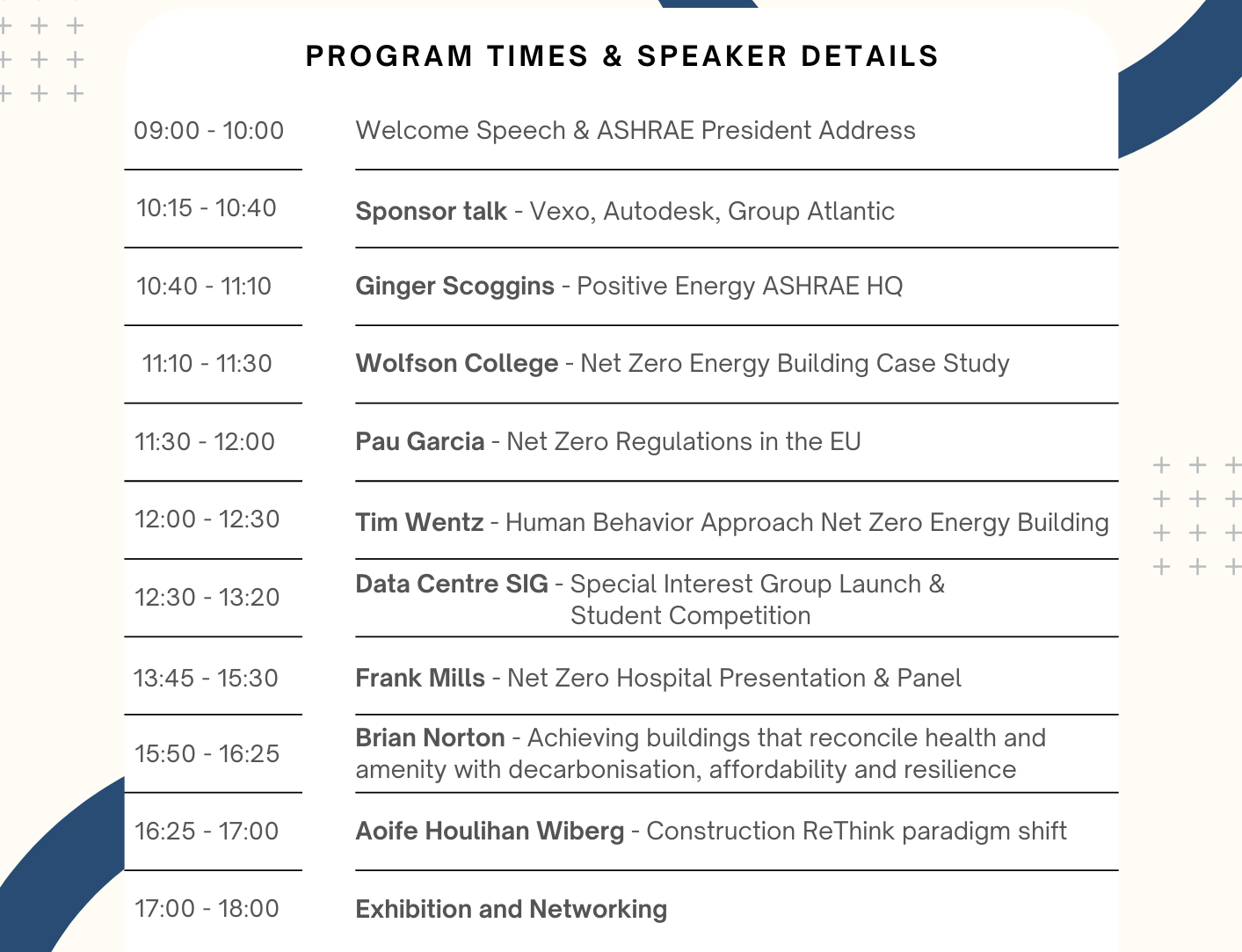



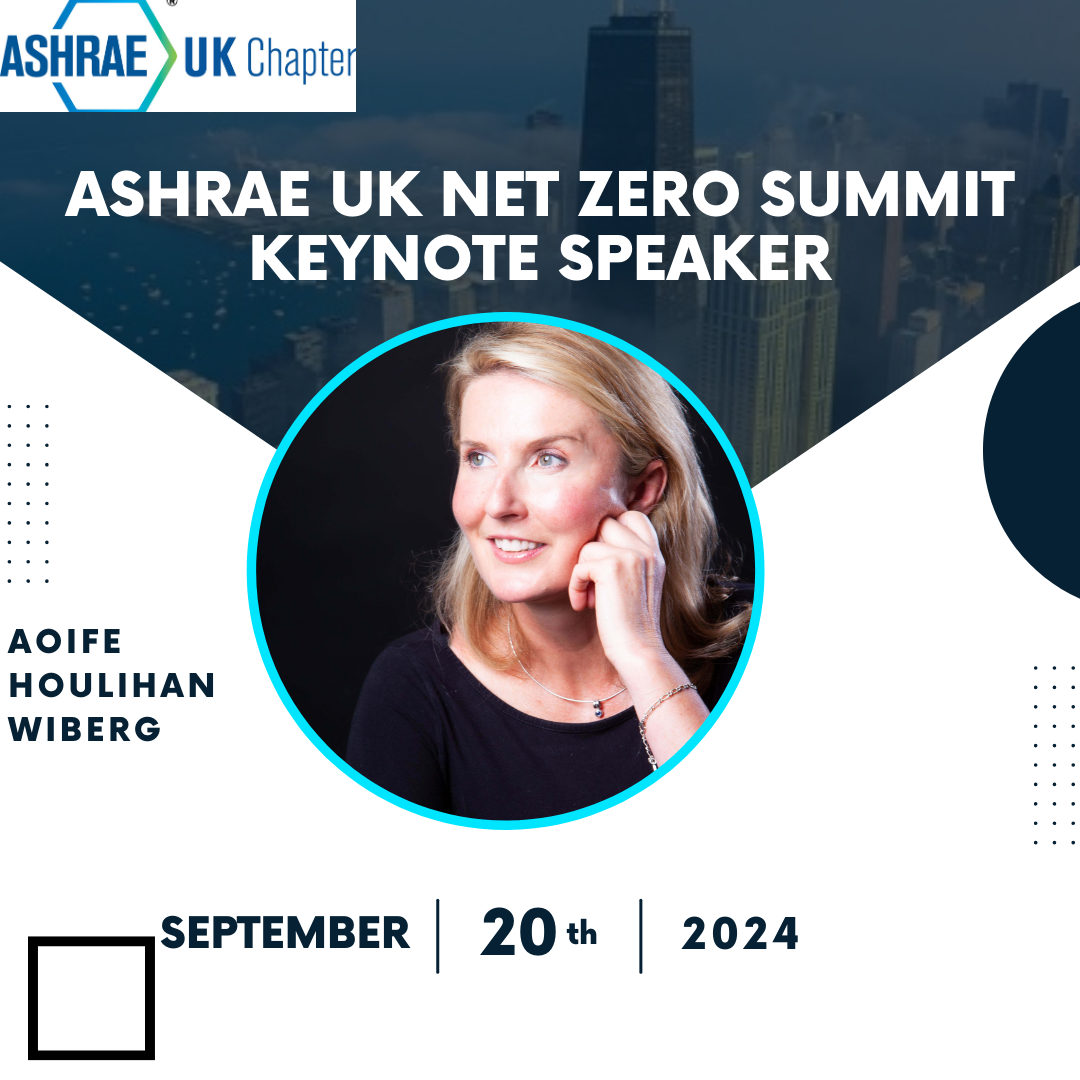

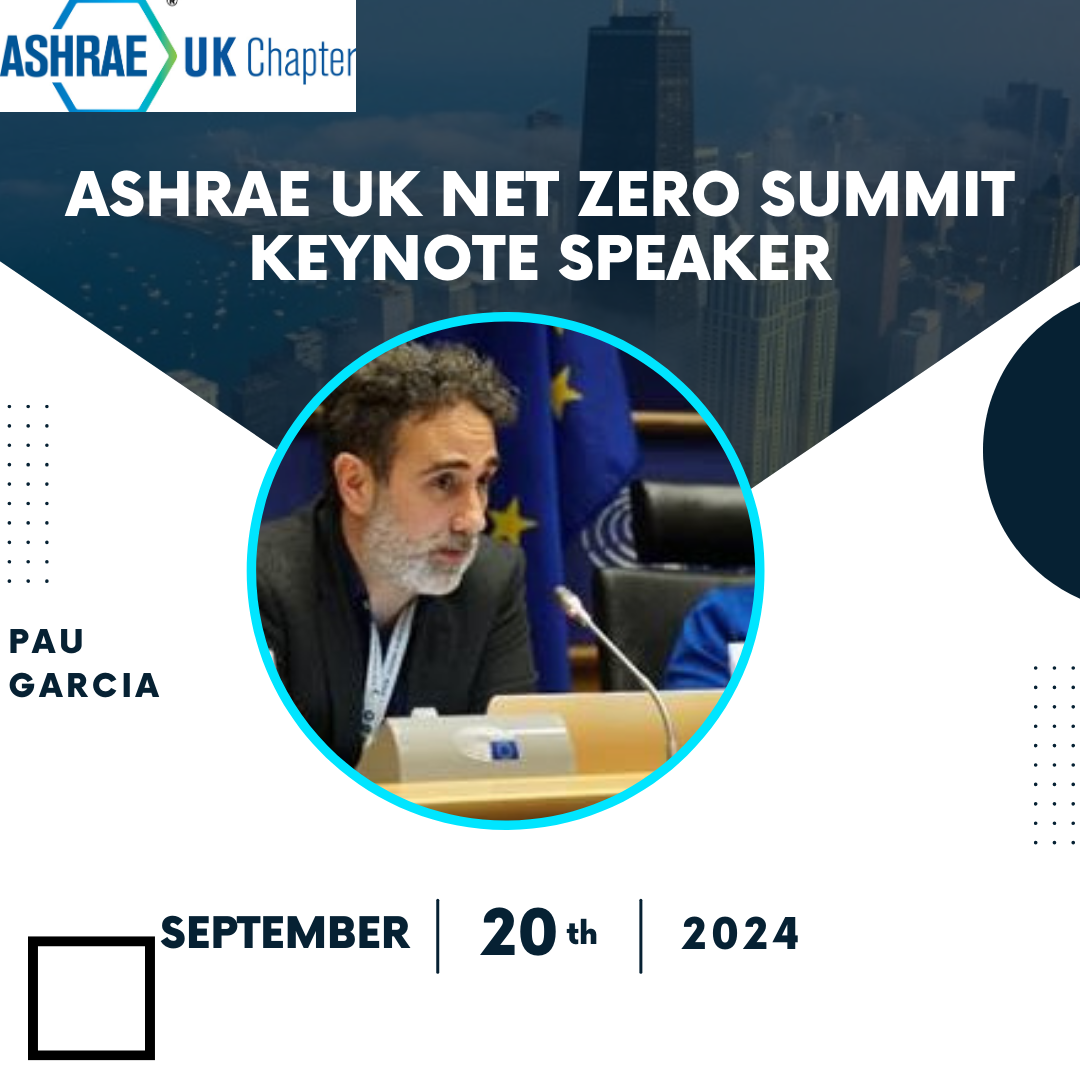
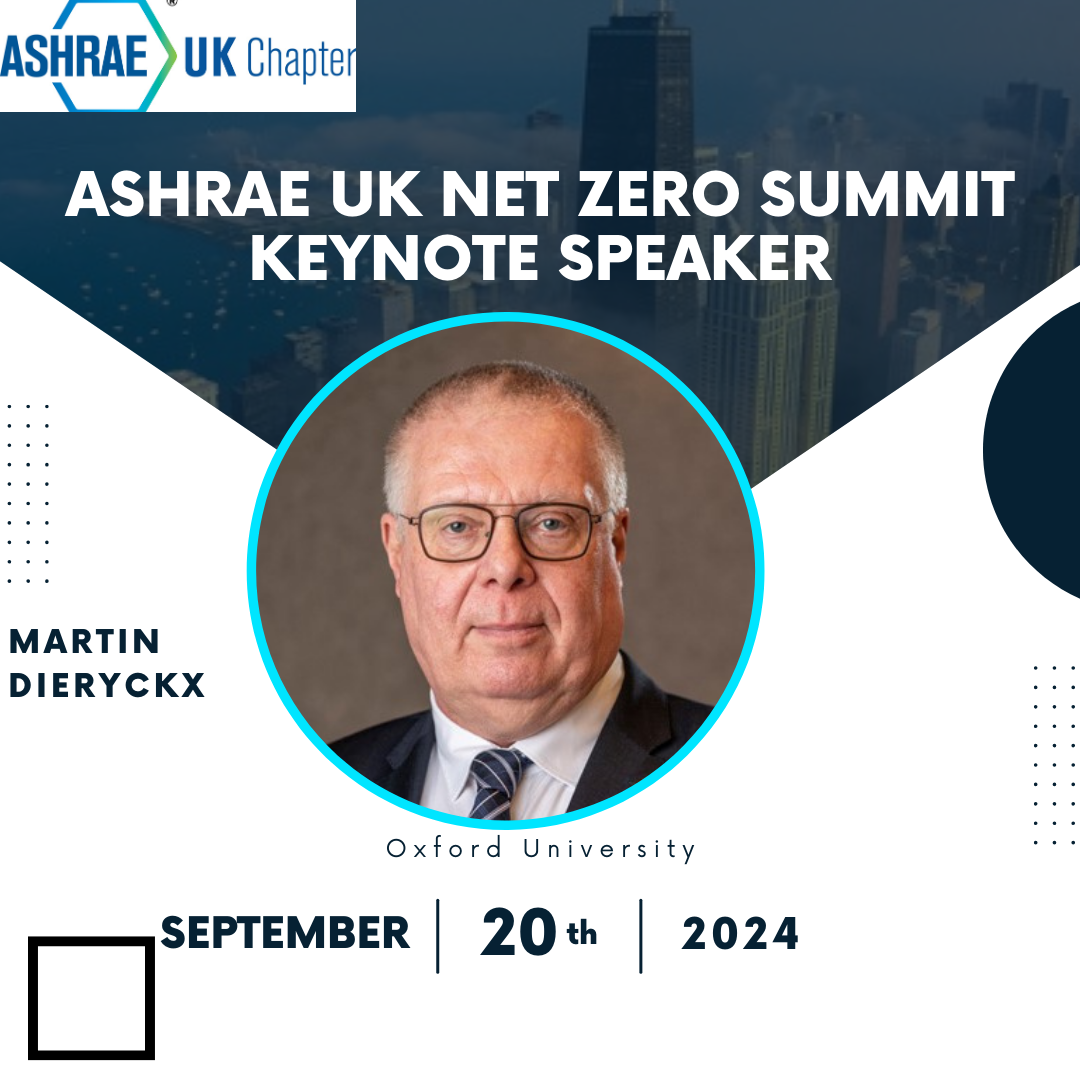


We are excited to invite you to our upcoming net zero event including a career fair, case studies, expert keynotes, and a round table panel.
EVENT HIGHLIGHTS
Key Note Speakers
Listen to presentations from experts in net zero. With topics ranging from case studies to sociotechnical perspectives.
Job Fair
Engage with industry and look for placements or a job at the job fair.
Net Zero Buildings Panel
Attend the 2-hour round table panel on net zero buildings led by Frank Mills
View the full program here.
Venue
Leonard Wolfson Auditorium Wolfson College, Linton Road, Oxford OX2 6UD
Keynote 1 - Professor Brian Norton

Professor Brian Norton PhD DSc DUniv(h.c.) FIAE MRIA is Emeritus Professor of Solar Energy Applications at TU Dublin, President of the European Sustainable Energy Innovation Alliance and a Vice-President of the European Academies Science Advisory Council.
His research is on the applications of solar energy particularly in the context of buildings. It has led to innovations in photovoltaics, glazing, daylighting devices and solar water and air-heating. He is particularly associated with conceiving and developing the use of phase change materials to cool photovoltaics.
His honours include an Honorary Doctorate from Universite de Technologie de Troyes, France, Fellowship of the Irish Academy of Engineering, Honorary Membership of the Daylight Academy, and Honorary Fellowship of the Chartered Institute of Building Services Engineers. He has been awarded the CIBSE Napier Shaw Medal; Energy Institute’s Roscoe Award, American Association of Publishers PROSE Award for the book “Comprehensive Renewable Energy”, Lifetime Achievement Award from the Solaris Conference series and “Solar Energy” Journal Best Paper Award in Photovoltaics. He is Visiting Professor at several universities internationally, supervised over sixty doctorates and his research outputs have received over 16,000 citations with an h-index of 65.
Professor Norton was Head of Energy Research at Tyndall National Institute, a Research Professor at University College Cork and Professor of Solar Energy Applications at TU Dublin. He was also a Principal Investigator in MaREI, the Irish national research centre for Energy, Climate and Marine. He was formally President of (what is now) Technological University Dublin for sixteen years and prior to that Dean of Engineering at Ulster University.
Achieving buildings that reconcile health and amenity with decarbonisation, affordability and resilience
Energy efficiency is not the prime function of buildings; rather they must primarily ensure a healthy, comfortable and safe set of amenities and services are provided whilst incurring minimal energy use. Buildings only use energy is used to meet occupants needs. Benefits and penalties, at varying scales and extents at different times, are consequential to that energy use. Decarbonisation of operational and embodied energy used in buildings obviously contributes to lowering greenhouse gas emissions. Local renewable energy generation can also contribute to resilient security of energy supply both at the building and nationally. However, affordability and resilience challenges can arise from overreliance on particular energy sources or supply from specific locations.
This presentation argues for a holistic approach to decarbonising energy use in buildings. Such an approach sets goals for health and amenity in the context of diverse aspects of decarbonisation, affordability and resilience. These can include smaller energy bills; better thermal comfort, internal air quality and access to daylight. To achieve these successfully requires research to identify optimal interventions, construction practices, mix of low-carbon heating and thermal energy storage and public investment in renovations for energy-poor household. These in turn depend on patterns, climate and occupancy patterns.
Keynote 2 - Timothy G. Wentz

Prof. Wentz graduated from the University of Nebraska with a Bachelor of Science degree in Mechanical Engineering and a Master’s degree in Business Administration. He is a registered professional engineer in Nebraska. Additionally, he holds both Master Heating Contractor and Master Plumbing Contractor licenses, is a LEED® – Accredited Professional (AP-BD&C)) and holds an ASHRAE certification as a High-performance Building Design Professional (HBDP).
Upon graduation from the University of Nebraska – Lincoln, Tim went to work for his family’s mechanical contracting firm where he developed an expertise in design/build contracting, estimating and project management on a wide range of commercial projects across the Midwest. Since entering academia in 1994, Prof. Wentz has received numerous awards and honors for his teaching and service to the HVAC industry. In 2000, ASHRAE awarded Tim the E. K. Campbell Award of Merit for outstanding service and achievement in teaching. The Mechanical Contractors Association of America (MCAA) has named Tim their national “Educator of the Year” award on three occasions, 2000, 2002 and 2004. In March of 2009, the MCAA awarded Tim its highest honor, the Distinguished Service Award and in 2015 ASHRAE awarded Tim the Exceptional Service Award. In recognition of his service to industry, in 2018 the College of Engineering at the University of Nebraska awarded Tim its inaugural Lifetime Achievement Award.
Prof. Wentz served on the Construction Management faculty in the College of Engineering for 25 years until being named an Emeritus Professor in 2018. He is also a very active volunteer within ASHRAE, where he has served as the Nebraska Chapter President for 1997-1998. He also served as Director and Regional Chair for Region IX of ASHRAE and was inducted into the Region IX Hall of Honor in 2005. ASHRAE also elected Tim a Fellow of the Society in 2005. Tim served as Society President in 2016-2017 and launched the Society theme for that year ‘Adapt Today to Shape Tomorrow’.
A Human Behavior Approach to Net Zero Energy Buildings
Keynote 3 - Aoife Houlihan Wiberg

Aoife Houlihan Wiberg B.Sc.(Hons.), B.Arch., M.Phil. (Cantab.), Ph.D. (Cantab), RIBA is A/Professor of Architecture at the Department of Architecture and Civil Engineering at the University of Bath. She is UK/Norwegian national expert in International Energy Agency IEA EBC Annex 89, 72 and 57 for the past 12 years. She is invited international guest speaker in Korea, Japan, Singapore, Malaysia, Indonesia, USA and in Europe. She is an international reviewer and sits on several scientific committees. She has over 15 years research experience and has developed an internationally recognised track record for undertaking high quality research in the field of climate resilience and net zero emission design strategies, dynamic LCA and Immersive technologies for stakeholder engagement. From 2012, she developed a novel method for embodied carbon calculation method for materials culminating in The ZEB tool, which was further developed and used to assess the performance of the Norwegian ZEB pilot projects and used for training of professionals/students.
She joined The Department of Architecture and Engineering at The University of Bath in early 2023 having previously held the position of Professor of Architecture and Chair of Research in Architecture at the Belfast School of Architecture and the Built Environment at Ulster University, Belfast, UK since 2019. She returned to the UK after working for 10 years at The Research Centre for Zero Emission Buildings (ZEB http://zeb.no/index.php/en/) and The Research Centre for Zero Emission Neighbourhoods in Smart Cities at the Norwegian University of Science and Technology, Trondheim, Norway (2010-2019). She is currently UK National Expert in the International Energy Agency (IEA EBC) Annex 89 – Ways to Implement Net-zero Whole Life Carbon Buildings (2023-28). Prior to this, she was leading research in Annex 72 – Assessing Life Cycle Related Environmental Impacts Caused by Buildings (2017-2023) and Annex 57 – Evaluation of Embodied Energy and CO2eq Emissions for building construction (2012-2015). She is a Chartered member of The Royal Institute of British Architects (RIBA) elected 2001 and graduated as an architect from The Welsh School of Architecture, Cardiff University. She completed her M.Phil.Environmental Design in Architecture and PhD Degree in Architecture from the University of Cambridge where she matriculated in 1997 and 2005 respectively.
Construction ReThink: The Future of Climate Resilient Net Zero WLC Buildings and Regenerative Design – An Urgent Need for a Paradigm Shift
Recent IPCC reports urges immediate, ambitious action to combat climate change, warning that human activities, especially fossil fuel use, are driving global warming. To avoid temperatures exceeding 1.5°C by 2040, emissions must reduce 43% in 6 years time by 2030 and 60% by 2035 just over a decade. There is a rapidly narrowing window of opportunity to enable climate resilient development and that the choices and actions implemented in this decade will have impacts now and for thousands of years (IPCC, 2023). To achieve this, there is an urgent need for a construction rethink and paradigm shift to transition to climate resilient, net zero WLC regenerative buildings which goes beyond reduce harm and climate mitigation by focusing on buildings that actively repair harm and also contribute to the restoration, enhancing biodiversity and restoring natural habitats. The first part of the presentation provides a brief overview of current International Decarbonisation Pathways with a focus on International Energy Agency IEA EBC Annex 89 – Ways to Implement Net Zero WLC buildings.
The next part of the presentation questions why zero emission buildings and neighbourhoods? Buildings and building construction sectors are responsible for nearly 40% of total direct and indirect CO2 emissions. (IEA) The energy use and related emissions may double or even triple (IPCC) by mid-century due to increased access to adequate housing and related facilities for people in developing countries, as well as, population growth, migration to cities, household size changes and increasing levels of wealth and lifestyle. Thus, improving the energy performance of the building stock and developing zero emission building and neighbourhood concepts are critical to avoid an in increase in GHG emissions. (ZEN, 2024). The presentation shares lessons learned from Norway highlighting the importance of pathways to net zero emission buildings (nZEB) and neighbourhoods (nZEN) in smart cities including definitions and results from the ZEB living labs which acted as innovation hubs for co-creation and transfer of knowledge between researchers and industry/users. The living labs acted to verify, document and ptimise real life performance of the designs developed by the ZEB and ZEN Centre, as well as, acting as lighthouse projects to learn, inspire and disseminate ZEN knowledge.
The presentation then wraps up with an example of recently awarded international research grant for participatory collaborative research to enhance climate change adaptation and mitigation in underserved communities by co-design three Climate Resilient Global Living Labs in Indonesia, Colombia and Gulf Coast USA.
Keynote 4 - Ginger Scoggins

Ginger Scoggins is a licensed mechanical engineer with over 30 years of experience. She is the President and Co-owner of Engineered Designs, Inc., a full-service engineering which she founded over 25 years ago. Ginger is also a certified commissioning agent, as well as a certified energy manager, and works on the design and commissioning of projects ranging from $4 million construction cost up to $90 million construction cost. Her focus is on designing high-performing buildings across a wide variety of markets.
In addition to running her firm, Ginger has been heavily involved in ASHRAE since 1988 when she joined the Triangle Chapter in Raleigh, North Carolina, becoming the first female president of the chapter in the 1995-96 year, the first female Regional Vice-chair, and the first female Director & Regional Chair for Region IV. Ginger was recently named a Fellow of the organization and is the current President-Elect for ASHRAE, becoming ASHRAE president in July of 2023.
Ginger has served ASHRAE on Society level committees including CEC (Conferences & Exposition Committee), which she chaired twice, as well as on the Society planning committee, finance committee, and membership promotion committee. She has served on all three ASHRAE councils, including as chair of both Technology Council and Member’s Council.
Ginger’s professional experience as a consulting engineer has spanned numerous market sectors, including laboratory design, telecommunications design, mission-critical spaces, and all levels of educational markets such as K-12, community college, and university projects. In addition, she has commissioned numerous projects for the same educational clients as well as the military.
ASHRAE HEADQUARTERS BLDG: A CASE STUDY
This presentation is a Case study of the renovation of the new ASHRAE headquarters that includes the goals, encountered issues and solutions for the project. The presentation will take the listener from the beginning of the efforts by the ASHRAE HQ Ad-hoc in developing the owner project requirements, thru the design, construction and commissioning team selection, into the design phase decisions and thru to the final product. It will discuss the financial impacts of decisions made and the cost of the project in detail.
Keynote 5 - Pau Garcia

Mr. Pau Garcia is a technical mechanical engineer, graduate from the Polytechnic University of Catalonia and holder of an MSc in Building Services Engineering from Loughborough University.
He has worked as a building services engineer in the private sector both in Spain and in the UK.
For the last 14 years he has been working in different positions within the European Commission. First as a project officer in charge of projects supporting innovation and policy on energy efficiency in buildings, and then as a Desk Officer in DG-REGIO managing programmes from the European Regional Funds. Since January 2018 he has been working as a policy officer within DG-ENERGY unit B3 “Energy Efficiency: Buildings and Products”, mostly dealing with the Energy Performance of Buildings Directive (EPBD). He is currently Team Leader for national renovation policies, funding and international cooperation on buildings policy.
2024 Recast of the Energy Performance of Buildings Directive (EPBD)
Keynote 6 - Martin Dieryckx

Martin Dieryckx is the General Manager of the EMEA environment research centre of Daikin Europe NV and advisor for North America environment aspects. He has 42 years of experience in Daikin for product development, environment research, standards and regulations related to air conditioning , heat pumps, refrigeration and chillers. He has expertise on the environmental impact to the business including safety aspects, life cycle environmental impact and circular economy. He was one of the lead authors of the IPCC Special report on safeguarding the ozone layer and the global climate system- Issues related to Hydrofluorocarbons and Perfluorocarbons and is recognized for its contribution to the Nobel peace prize award 2007 for the IPCC. In the RTOC ( UNEP Refrigeration,A/C and heatpumps Rechnical Option Committee) he was co-author for the heatpumps in 2010 and lead author for the reports 2014,2018 and 2022 and co-author for several other chapters. He is a master of science in engineering technology and is a ‘Fellow’ of ASHRAE.
Impact of New EPBD and European Standards toward Heat Pumps
The New Energy Performance of Buildings Directive (EPBD) has set new targets for buildings including both energy and emission performance.Heat pumps play an important role towards the achievement of the goals. It is important to have the proper evaluation of the heat pump performance in the building. European standards are under development to reflect this performance based on data to be provided for heat pumps under the European directive for eco-design of products. Dynamic simulations using hourly methods may result in more optimised and affordable solutions. A unified approach in Europe will create multiple benefits.
TECHNICAL SESSION ON HEALTHCARE ENGINEERING
THE NEW ASHRAE GUIDE FOR DECARBONISATION OF NEW HOSPITALS
Chair: Mike Ralph, Chief Engineer NHS Scotland
- THE NEW ASHRAE GUIDE FOR DECARBONISATION OF NEW HOSPITALS
This guide is focussed on new hospitals which will be all electric, but has many engineering solutions which could also be applied to existing hospitals to reduce carbon as part of their roadmap to net Zero carbon.
- THE NEW ASHRAE/REHVA DESIGN GUIDE FOR NET ZERO ALL HOSPITALS
A separate guide for net zero energy hospitals has been developed by ASHRAE in conjunction with REHVA , which includes CIBSE, which can be used for all hospitals – existing as well as new.
Frank Mills FASHRAE, member of Publications Committee ASHRAE TC 9.6, Energy sub committee
- NEW, ADVANCED STRATEGIES FOR VENTILATION IN UK HOSPITALS
UK hospitals have been designed and operated on the basis of Health Technical Memorandum 03-01 Specialised ventilation for healthcare premises. However, HTM 03 has failed to update itself to include recent developments in equipment and practices in a way that could deliver major cost saving benefits and help toward meeting the challenges of climate change, better patient and staff environments and economic .improvements.
Professor Tony Fisher MBE, MD, PhD, Consultant Clinical Scientist, Health Innovation North West, and Dept of Physics University of Liverpool and Frank Mills FASHRAE ,
- UK TARGETS FOR NET ZERO – NHS NET ZERO BUILDING STANDARD 2022
Climate change threatens the foundations of good health, with direct and immediate consequences for our patients, the public and the NHS. In 2019, the UK became the first major economy to commit to net zero emissions by 2050. In 2020, the NHS became the first national health system in the world to commit to net zero emissions, launching its new National Programme for a Greener NHS.

PROFESSOR TONY FISHER

FRANCIS MILLS, FIMechE, FCIBSE, FASHRAE
Professional consulting engineer,
Consulting engineer in healthcare including Infection control engineering, NZ hospitals and HVAC engineering in hospitals and clinics
Past Chair of Construction and Building Services Division, TSB member and Council member of IMechE and Founder member of IMechE Covid Task Force and presenter of webinars and CPD sessions on airborne infection control .
ASHRAE Distinguished Lecturer, Member of ASHRAE Covid Epidemic Task Force,ASHRAE TC 9.6, Healthcare and joint lead author NZ Hospital guide
Past Chair of CIBSE Healthcare Group 2017 to 2021 and member of Covid advisory group
Member of Royal Academy of Engineering Covid working group 2020 to 2023.
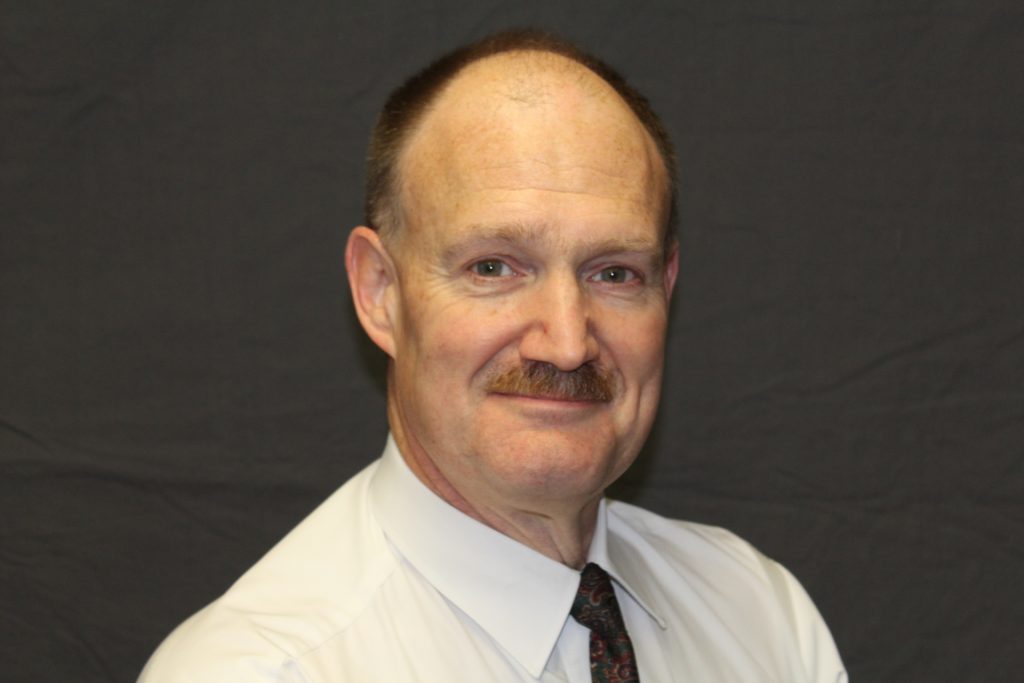
MICHAEL RALPH
Mike is a chartered mechanical engineer and fellow of the IMechE, after an Army/MoD apprenticeship and adult service, he has been in the NHS for 35 years the last 20 as executive director/ national engineering lead at various trusts and organisations. Mike was national lead for NHS estate services for IAQ and oxygen resilience in the pandemic and has continued that work for ventilation and building resilience from Nosocomial infection and the review of how we ventilate our hospitals. Mikes current role is that of head of energy for National Services Scotland NHS Assure and he leads on the energy transition delivery and NZC health care agenda for Scotland
